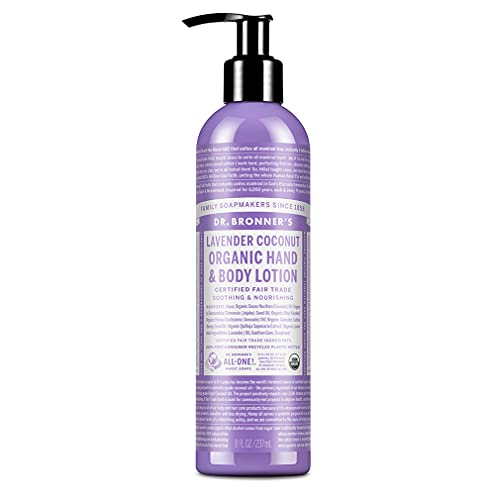
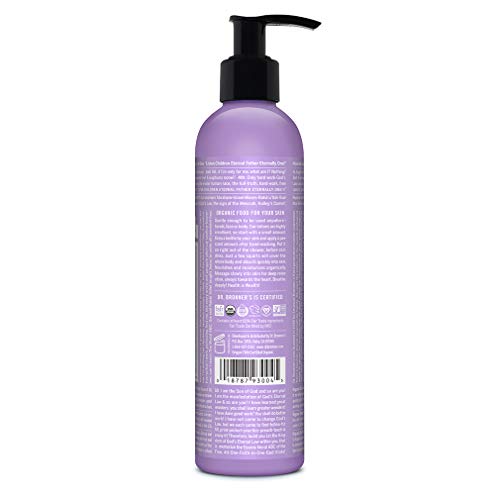
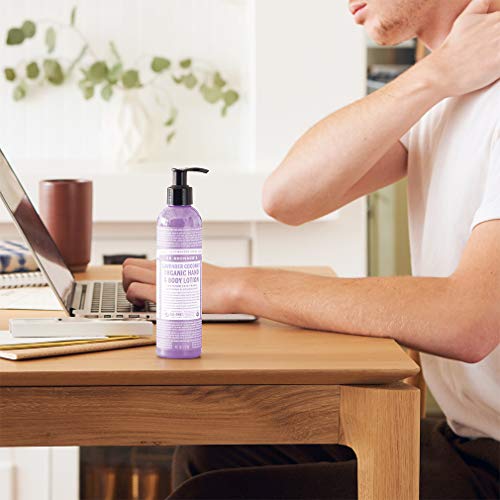
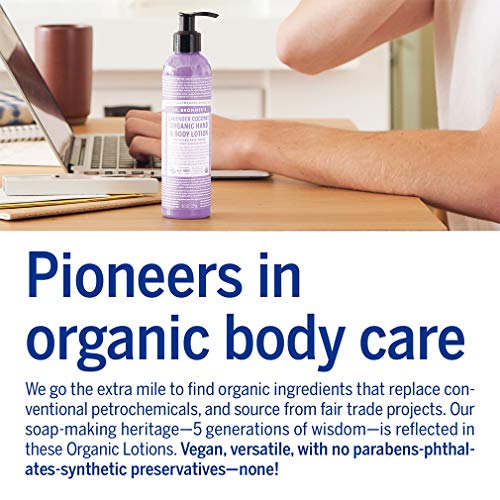
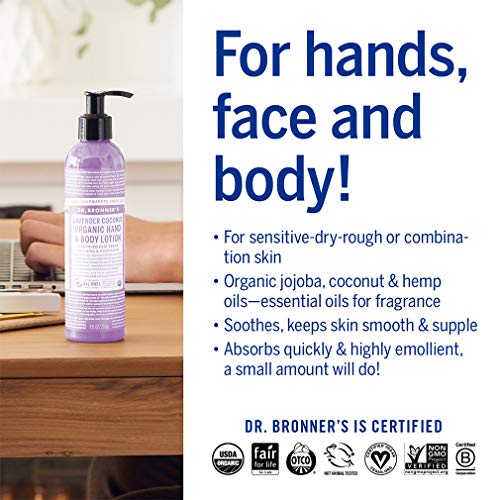
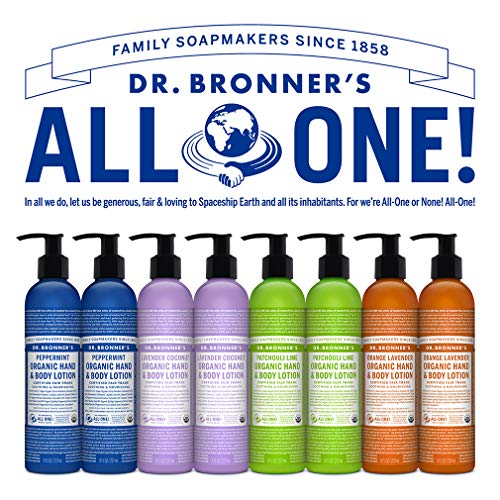
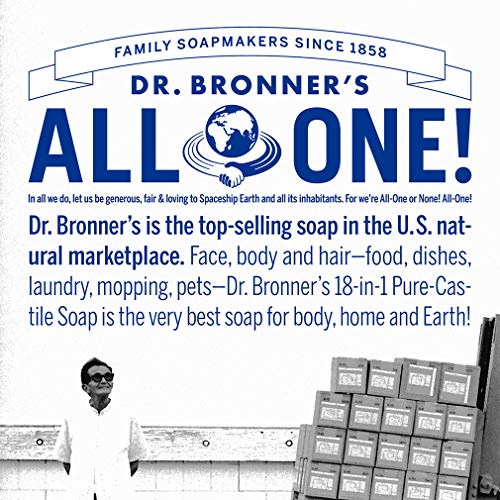
Dr. Bronner's Organic Body Lotion - Nourishing Lavender Coconut, Vegan, Non-GMO - 8oz


Cannabis Sativa (Hemp) Seed Oil
Medium RiskCannabis sativa (hemp) seed oil is extracted from the seeds of the hemp plant. It is rich in essential fatty acids and is commonly used in cosmetic and health products for its moisturizing properties and potential nutritional benefits.
Sustai Insights
Hemp seed oil offers functional benefits such as being a moisturizing agent and providing essential fatty acids. It is typically sustainably sourced and biodegradable. Health risks are low, with minimal concerns regarding carcinogenicity, allergies, and reproductive toxicity. Regulatory warnings exist due to moderate use restrictions. Environmental risks are also low, indicating it does not significantly contribute to pollution or bioaccumulation. Overall, the ingredient is assessed as medium risk, and safe usage practices should be followed. Alternatives include other plant-based oils that offer similar benefits.
Lavandula Angustifolia (Lavender) Oil
Low RiskLavandula angustifolia (lavender) oil is a volatile oil derived from the flowers of the lavender plant. It is commonly used in cosmetic and personal care products for its fragrance and potential calming properties.
Sustai Insights
Lavender oil offers functional benefits such as providing fragrance and potential relaxation effects. It is biodegradable and often sustainably sourced. Health risks are minimal, with low concerns for carcinogenicity, allergies, or reproductive toxicity; however, there is a low to moderate concern regarding endocrine disruption. Environmental risks are low, with no significant pollutant or bioaccumulation potential noted. Regulatory status is favorable, with no current restrictions. Safe usage practices include avoiding excessive concentrations, especially in sensitive applications. Overall, the risk level associated with lavender oil is assessed as low.
Quillaja Saponaria (Soapbark) Bark Extract
Low RiskQuillaja saponaria (soapbark) bark extract is derived from the bark of the Quillaja saponaria tree, known for its saponins, which are natural surfactants. This extract is commonly used in personal care products for its foaming and emulsifying properties, enhancing product texture and stability.
Sustai Insights
Quillaja saponaria bark extract offers functional benefits as an effective emulsifier and foaming agent, contributing to product texture and stability. It is sustainably sourced and biodegradable. Health risks are minimal, with low concerns related to carcinogenicity, allergies, and reproductive toxicity. Environmental risks are also low, with no significant pollution or bioaccumulation potential identified. Regulatory assessments indicate no current restrictions. Overall, the ingredient is considered to have a low risk profile, making it a safe choice in formulation.
Ethanol
Low RiskEthanol, also known as ethyl alcohol, is a volatile, colorless liquid commonly used as a solvent, preservative, and antiseptic in various personal care products. It serves as a penetration enhancer, improving the absorption of other ingredients through the skin.
Sustai Insights
Ethanol functions effectively as a preservative and solvent, offering benefits such as enhanced ingredient absorption and antimicrobial properties. It is biodegradable and can be sustainably sourced. Health risks are minimal, with low concerns for carcinogenicity, allergies, and developmental toxicity. Environmental impacts are also low, with no significant pollutant potential. Regulatory agencies do not impose restrictions on its use. Overall, ethanol is considered low risk, making it a widely accepted ingredient in personal care formulations.
Persea Gratissima (Avocado) Oil
Low RiskPersea gratissima (avocado) oil is derived from the fruit of the avocado tree. It is commonly used in cosmetic formulations for its moisturizing properties, serving as an emollient that enhances skin hydration and improves product texture.
Sustai Insights
Avocado oil offers functional benefits as a moisturizer and emollient, known for its ability to nourish and hydrate the skin. It is sustainably sourced and biodegradable. Health risks are minimal, with low concerns regarding carcinogenicity, allergies, and reproductive toxicity. Environmental risks are also low, with no significant pollutant or bioaccumulation potential. Regulatory bodies have not issued warnings against its use. Overall, the ingredient is assessed as low risk, making it a safe choice for cosmetic applications.
Water
Low RiskWater is a clear, colorless liquid essential for various biological processes. It serves as a solvent in formulations, facilitating the dissolution of other ingredients and enhancing product texture and application. Additionally, water plays a crucial role in hydration and is a key component in many cosmetic and personal care products.
Sustai Insights
Water is an effective solvent and hydrator, contributing to the texture and efficacy of formulations. It is biodegradable and generally regarded as safe, with low concerns regarding carcinogenicity, allergies, and reproductive toxicity. However, excessive water usage can lead to environmental concerns, particularly regarding resource depletion. Regulatory bodies do not impose restrictions on water use in cosmetics. Overall, the risks associated with water are low, making it a safe and essential ingredient.
Tocopherol
Low RiskTocopherols are a class of naturally occurring compounds, primarily known for their role as antioxidants. They are commonly used in cosmetic and skincare products to help stabilize formulations and protect ingredients from oxidative damage.
Sustai Insights
Tocopherols provide functional benefits such as antioxidant protection and skin conditioning. They are generally recognized as safe, with low concerns regarding carcinogenicity, allergies, and reproductive toxicity. However, enhanced skin absorption and potential endocrine disruption are noted. Regulatory bodies have not imposed significant restrictions on tocopherols, categorizing the overall risk as low. Safe usage practices should be observed, and while alternatives exist, tocopherols remain a viable option in formulations.
Xanthan Gum
Low RiskXanthan gum is a polysaccharide, a sugar-based compound produced by the fermentation of glucose or sucrose. It is commonly used as a thickening agent and stabilizer in various food and cosmetic products due to its ability to improve texture and prevent ingredient separation.
Sustai Insights
Xanthan gum serves effectively as a thickener and stabilizer, enhancing product texture and consistency. It is biodegradable and typically derived from renewable sources, supporting sustainability efforts. Health risks are minimal, with low concerns regarding carcinogenicity, allergies, and reproductive toxicity. Environmental impact is similarly low, posing no significant hazards. Regulatory agencies, including the FDA, regard it as safe for use, with no significant restrictions. Overall, xanthan gum is assessed as low risk, making it a suitable ingredient in formulations.
Cocos Nucifera (Coconut) Oil
Low RiskCocos Nucifera (Coconut) Oil is derived from the kernels of the coconut palm. It is primarily used in cosmetic formulations for its emollient and moisturizing properties, making it suitable for skin and hair care products.
Sustai Insights
Coconut oil serves as an effective moisturizer and emollient, promoting skin hydration and softness. It is sustainably sourced and biodegradable. Health risks are minimal, with low concerns regarding carcinogenicity, allergens, and reproductive toxicity. Environmental impact is also low, as it does not contribute significantly to pollution or bioaccumulation. Regulatory bodies have not issued restrictions on its use. Overall, coconut oil presents a low risk for health and environmental concerns, making it a safe ingredient in cosmetic products.
Simmondsia Chinensis (Jojoba) Seed Oil
Low RiskSimmondsia chinensis (jojoba) seed oil is extracted from the seeds of the jojoba plant. It is commonly used in cosmetics for its moisturizing properties and ability to mimic human sebum, making it beneficial for skin and hair care formulations.
Sustai Insights
Jojoba seed oil offers functional benefits such as effective moisturization and emollience, contributing to skin hydration and smoothness. It is sustainably sourced and biodegradable. Health risks are low, with minimal concerns regarding carcinogenicity, allergies, and reproductive toxicity. Environmental risks are also low, as it does not significantly contribute to pollution or bioaccumulation. Currently, there are no regulatory restrictions on its use. Overall, the risk level is low, and it is considered a safe ingredient with no significant adverse effects.
Lavandula Angustifolia (Lavender) Oil
Low RiskLavandula angustifolia (lavender) oil is a volatile oil derived from the flowers of the lavender plant. It is commonly used in cosmetic and personal care products for its fragrance and potential calming properties.
Sustai Insights
Lavender oil offers functional benefits such as providing fragrance and potential relaxation effects. It is biodegradable and often sustainably sourced. Health risks are minimal, with low concerns for carcinogenicity, allergies, or reproductive toxicity; however, there is a low to moderate concern regarding endocrine disruption. Environmental risks are low, with no significant pollutant or bioaccumulation potential noted. Regulatory status is favorable, with no current restrictions. Safe usage practices include avoiding excessive concentrations, especially in sensitive applications. Overall, the risk level associated with lavender oil is assessed as low.
Quillaja Saponaria (Soapbark) Bark Extract
Low RiskQuillaja saponaria (soapbark) bark extract is derived from the bark of the Quillaja saponaria tree, known for its saponins, which are natural surfactants. This extract is commonly used in personal care products for its foaming and emulsifying properties, enhancing product texture and stability.
Sustai Insights
Quillaja saponaria bark extract offers functional benefits as an effective emulsifier and foaming agent, contributing to product texture and stability. It is sustainably sourced and biodegradable. Health risks are minimal, with low concerns related to carcinogenicity, allergies, and reproductive toxicity. Environmental risks are also low, with no significant pollution or bioaccumulation potential identified. Regulatory assessments indicate no current restrictions. Overall, the ingredient is considered to have a low risk profile, making it a safe choice in formulation.
Cannabis Sativa (Hemp) Seed Oil
Medium RiskCannabis sativa (hemp) seed oil is extracted from the seeds of the hemp plant. It is rich in essential fatty acids and is commonly used in cosmetic and health products for its moisturizing properties and potential nutritional benefits.
Sustai Insights
Hemp seed oil offers functional benefits such as being a moisturizing agent and providing essential fatty acids. It is typically sustainably sourced and biodegradable. Health risks are low, with minimal concerns regarding carcinogenicity, allergies, and reproductive toxicity. Regulatory warnings exist due to moderate use restrictions. Environmental risks are also low, indicating it does not significantly contribute to pollution or bioaccumulation. Overall, the ingredient is assessed as medium risk, and safe usage practices should be followed. Alternatives include other plant-based oils that offer similar benefits.
Ethanol
Low RiskEthanol, also known as ethyl alcohol, is a volatile, colorless liquid commonly used as a solvent, preservative, and antiseptic in various personal care products. It serves as a penetration enhancer, improving the absorption of other ingredients through the skin.
Sustai Insights
Ethanol functions effectively as a preservative and solvent, offering benefits such as enhanced ingredient absorption and antimicrobial properties. It is biodegradable and can be sustainably sourced. Health risks are minimal, with low concerns for carcinogenicity, allergies, and developmental toxicity. Environmental impacts are also low, with no significant pollutant potential. Regulatory agencies do not impose restrictions on its use. Overall, ethanol is considered low risk, making it a widely accepted ingredient in personal care formulations.
Persea Gratissima (Avocado) Oil
Low RiskPersea gratissima (avocado) oil is derived from the fruit of the avocado tree. It is commonly used in cosmetic formulations for its moisturizing properties, serving as an emollient that enhances skin hydration and improves product texture.
Sustai Insights
Avocado oil offers functional benefits as a moisturizer and emollient, known for its ability to nourish and hydrate the skin. It is sustainably sourced and biodegradable. Health risks are minimal, with low concerns regarding carcinogenicity, allergies, and reproductive toxicity. Environmental risks are also low, with no significant pollutant or bioaccumulation potential. Regulatory bodies have not issued warnings against its use. Overall, the ingredient is assessed as low risk, making it a safe choice for cosmetic applications.
Water
Low RiskWater is a clear, colorless liquid essential for various biological processes. It serves as a solvent in formulations, facilitating the dissolution of other ingredients and enhancing product texture and application. Additionally, water plays a crucial role in hydration and is a key component in many cosmetic and personal care products.
Sustai Insights
Water is an effective solvent and hydrator, contributing to the texture and efficacy of formulations. It is biodegradable and generally regarded as safe, with low concerns regarding carcinogenicity, allergies, and reproductive toxicity. However, excessive water usage can lead to environmental concerns, particularly regarding resource depletion. Regulatory bodies do not impose restrictions on water use in cosmetics. Overall, the risks associated with water are low, making it a safe and essential ingredient.
Tocopherol
Low RiskTocopherols are a class of naturally occurring compounds, primarily known for their role as antioxidants. They are commonly used in cosmetic and skincare products to help stabilize formulations and protect ingredients from oxidative damage.
Sustai Insights
Tocopherols provide functional benefits such as antioxidant protection and skin conditioning. They are generally recognized as safe, with low concerns regarding carcinogenicity, allergies, and reproductive toxicity. However, enhanced skin absorption and potential endocrine disruption are noted. Regulatory bodies have not imposed significant restrictions on tocopherols, categorizing the overall risk as low. Safe usage practices should be observed, and while alternatives exist, tocopherols remain a viable option in formulations.
Xanthan Gum
Low RiskXanthan gum is a polysaccharide, a sugar-based compound produced by the fermentation of glucose or sucrose. It is commonly used as a thickening agent and stabilizer in various food and cosmetic products due to its ability to improve texture and prevent ingredient separation.
Sustai Insights
Xanthan gum serves effectively as a thickener and stabilizer, enhancing product texture and consistency. It is biodegradable and typically derived from renewable sources, supporting sustainability efforts. Health risks are minimal, with low concerns regarding carcinogenicity, allergies, and reproductive toxicity. Environmental impact is similarly low, posing no significant hazards. Regulatory agencies, including the FDA, regard it as safe for use, with no significant restrictions. Overall, xanthan gum is assessed as low risk, making it a suitable ingredient in formulations.
Cocos Nucifera (Coconut) Oil
Low RiskCocos Nucifera (Coconut) Oil is derived from the kernels of the coconut palm. It is primarily used in cosmetic formulations for its emollient and moisturizing properties, making it suitable for skin and hair care products.
Sustai Insights
Coconut oil serves as an effective moisturizer and emollient, promoting skin hydration and softness. It is sustainably sourced and biodegradable. Health risks are minimal, with low concerns regarding carcinogenicity, allergens, and reproductive toxicity. Environmental impact is also low, as it does not contribute significantly to pollution or bioaccumulation. Regulatory bodies have not issued restrictions on its use. Overall, coconut oil presents a low risk for health and environmental concerns, making it a safe ingredient in cosmetic products.
Simmondsia Chinensis (Jojoba) Seed Oil
Low RiskSimmondsia chinensis (jojoba) seed oil is extracted from the seeds of the jojoba plant. It is commonly used in cosmetics for its moisturizing properties and ability to mimic human sebum, making it beneficial for skin and hair care formulations.
Sustai Insights
Jojoba seed oil offers functional benefits such as effective moisturization and emollience, contributing to skin hydration and smoothness. It is sustainably sourced and biodegradable. Health risks are low, with minimal concerns regarding carcinogenicity, allergies, and reproductive toxicity. Environmental risks are also low, as it does not significantly contribute to pollution or bioaccumulation. Currently, there are no regulatory restrictions on its use. Overall, the risk level is low, and it is considered a safe ingredient with no significant adverse effects.
Experience the soothing benefits of Dr. Bronner's Organic Lotion in Lavender Coconut. Crafted with USDA organic and fair trade ingredients, this body lotion nourishes and hydrates, making it perfect for all skin types.
- Hydration & Nourishment: Enriched with organic jojoba and coconut oils, this lotion deeply moisturizes while promoting skin elasticity and softness.
- Gentle Formula: Ideal for sensitive, dry, or combination skin, it’s suitable for use on hands, face, and body, ensuring a soothing experience everywhere.
- Quick Absorption: Highly emollient and fast-absorbing, it leaves your skin feeling smooth without any greasy residue. Perfect after hand-washing or post-shower.
- Pure Ingredients: Formulated with only the purest organic essential oils, you can indulge in a calming lavender aroma while caring for your skin.
- Certified Organic: Compliant with the National Organic Program, this lotion is made from ingredients you can trust, reflecting Dr. Bronner's commitment to quality and sustainability.
Subscribe & Save with Sustai
- Best Price Guarantee: Always enjoy the lowest prices on sustainable home essentials.
- No Surprises: We’ll notify you before shipping. No hidden fees, ever.
- You’re in Charge: Change, pause, or cancel your subscription anytime with ease.
- Eco-Friendly Deliveries: Our grouped shipments mean less packaging and lower emissions.
Join us on a sustainable journey. Special offers for a limited time! Prices and promotions may change.
Recommended Products
Experience the soothing benefits of Dr. Bronner's Organic Lotion in Lavender Coconut. Crafted with USDA organic and fair trade ingredients, this body lotion nourishes and hydrates, making it perfect for all skin types.
- Hydration & Nourishment: Enriched with organic jojoba and coconut oils, this lotion deeply moisturizes while promoting skin elasticity and softness.
- Gentle Formula: Ideal for sensitive, dry, or combination skin, it’s suitable for use on hands, face, and body, ensuring a soothing experience everywhere.
- Quick Absorption: Highly emollient and fast-absorbing, it leaves your skin feeling smooth without any greasy residue. Perfect after hand-washing or post-shower.
- Pure Ingredients: Formulated with only the purest organic essential oils, you can indulge in a calming lavender aroma while caring for your skin.
- Certified Organic: Compliant with the National Organic Program, this lotion is made from ingredients you can trust, reflecting Dr. Bronner's commitment to quality and sustainability.

You can have at most 2 Sustainable Steals products in your cart
Customer Reviews
Customers’ View
Customers appreciate the moisturizing qualities and organic formulation of the Lavender Coconut Body Lotion, noting its effectiveness in hydrating without irritating sensitive skin. Many commend its blend of natural oils, such as jojoba and coconut, which contribute to a nourishing experience. Sentiments on the scent vary, with some enjoying its subtlety while others find it too strong. The lotion is described as lightweight and easily absorbed; however, a portion of users mention that its watery consistency can be a drawback, leading to less satisfaction in terms of moisture retention. Overall, customers value the product's commitment to organic ingredients and its eco-friendly appeal, making it a suitable choice for health-conscious individuals.
AI-generated from the text of customer reviewsThis product has no reviews yet.





